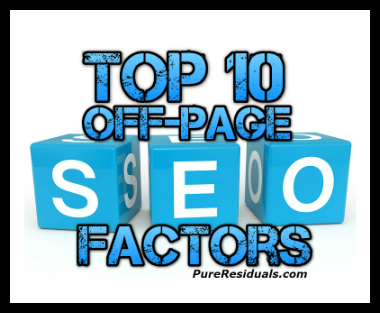TOP TEN OFF-PAGE SEO FACTORS
 What are Off-Page SEO Factors?
What are Off-Page SEO Factors?
Off-page SEO is defined as those things that are not actually a part of the website but are more a part of and/or result of activities outside of the actual website.
Here are the top TEN off-page SEO factors:
- Domain age: The older the domain, the more emphasis it is given by Google. They assume that if it’s been around for a while, it must be more relevant.
- Page Authority: the Moz ranking system for PA (Page Authority) is based on a 100 point scaling system using an algorithm that Moz created to judge or predict the ability of a specific site to rank well down the road. This is built using all of the Moz ranking factors such as backlinks, trust and several others they don’t really disclose.
- Page backlinks: Links from other sites to a specific page on your site are considered to be very important because if others feel your site is worth linking to, then it must be an authority site. The actual page rank of the back linked pages does have some impact on the effectiveness of the back link.
- Domain backlinks: Although many older sites may have a large number of back links, this may be the only reason it is ranked high. Page back links are much more important.
- Page.edu and.gov backlinks: Having back links from.edu (Education) and.gov (Government) sites tells Google that your site is important enough that educational and government sites point to it.
- DMOZ Directory: Having your site listed in the DMOZ Open Directory Project adds off page credibility to your site. The Open Directory Project is the largest, most comprehensive human-edited directory of the Web. It is constructed and maintained by a vast global community of volunteer editors.
- Yahoo Directory: The Yahoo Directory is the first large scale directory of the internet and lists sites categorized by topic and location. Google feels that if you are willing to pay the $300 annual fee to get listed here, then you are most likely putting in the effort to make your site relevant.
- Inbound linking: Websites with quality inbound links are ranked higher by search engines. A link from a reputed website is equivalent to an endorsement and adds to your website’s credibility and relevance to customers’ needs. Take part in blog discussions, register the website on known web directories, exchange links with relevant industry websites, and get your website included in blogrolls to get inbound links. Outward links to quality websites or blogs also make a difference.
- Blogging: Almost every business website today includes a blog. However, it isn’t only your own blog that you should focus on. Leave meaningful guest comments on other blogs. Keep your blog interesting with blogrolls, videos, and audios, games, quizzes, latest news, etc. As more people show interest in your blog posts, the volume of inbound links also increases. Social bookmarking websites enable you to drive more traffic to your website and also qualify leads by posting informational material with persuasive descriptions.
- Networking on social media websites: Social media websites are the perfect place to advertise your products and services, and spread brand awareness. There are many websites such as LinkedIn, Facebook, Orkut, and Twitter where you can create profiles and engage audiences. Industry leaders are harnessing the power of social media by posting videos on YouTube and popular websites. Besides added online visibility, you also get the opportunity to interact with prospective and existing customers, discuss concerns and issues, and build customer relationships. Specific forums allow you to engage niche audiences and get noticed as a reliable vendor. You should ensure frequent participation in forums to establish your presence. As your posts get attention, traffic to your website will increase and your interaction will give you somewhat of an authority status.
So the off-page SEO factors are things that can occur independent of your website, such as page ranking, backlinking and whether the site is listed in certain directories. Off-page optimization gives search engines information relative to your standing with other websites – an important factor for search engines to measure the worth and relevance of your website. On-age and off-page SEO factors combine to get your website better ranking and more customers.







